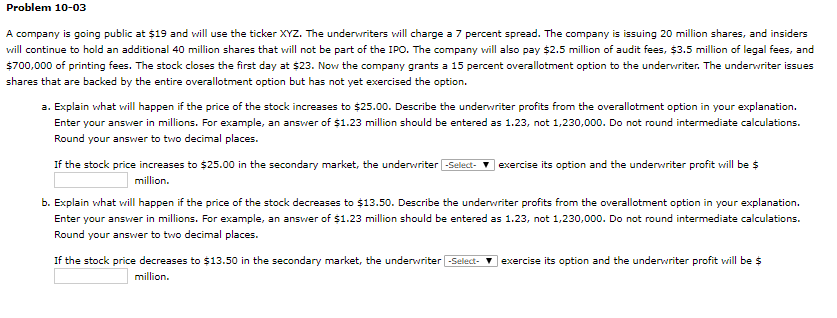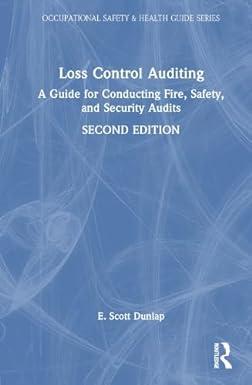
 DROP DOWN CHOICES ARE WILL OR WILL NOT
DROP DOWN CHOICES ARE WILL OR WILL NOT
Problem 10-03 A company is going public at $19 and will use the ticker XYZ. The underwriters will charge a 7 percent spread. The company is issuing 20 million shares, and insiders will continue to hold an additional 40 million shares that will not be part of the IPO. The company will also pay $2.5 million of audit fees, $3.5 million of legal fees, and $700,000 of printing fees. The stock closes the first day at $23. Now the company grants a 15 percent overallotment option to the underwriter. The underwriter issues shares that are backed by the entire overallotment option but has not yet exercised the option. a. Explain what will happen if the price of the stock increases to $25.00. Describe the underwriter profits from the overallotment option in your explanation. Enter your answer in millions. For example, an answer of $1.23 million should be entered as 1.23, not 1,230,000. Do not round intermediate calculations. Round your answer to two decimal places. If the stock price increases to $25.00 in the secondary market, the underwriter -Select- exercise its option and the underwriter profit will be $ million. b. Explain what will happen if the price of the stock decreases to $13.50. Describe the underwriter profits from the overallotment option in your explanation. Enter your answer in millions. For example, an answer of $1.23 million should be entered as 1.23, not 1,230,000. Do not round intermediate calculations. Round your answer to two decimal places. If the stock price decreases to $13.50 in the secondary market, the underwriter -Select- exercise its option and the underwriter profit will be $ million. Problem 10-03 A company is going public at $19 and will use the ticker XYZ. The underwriters will charge a 7 percent spread. The company is issuing 20 million shares, and insiders will continue to hold an additional 40 million shares that will not be part of the IPO. The company will also pay $2.5 million of audit fees, $3.5 million of legal fees, and $700,000 of printing fees. The stock closes the first day at $23. Now the company grants a 15 percent overallotment option to the underwriter. The underwriter issues shares that are backed by the entire overallotment option but has not yet exercised the option. a. Explain what will happen if the price of the stock increases to $25.00. Describe the underwriter profits from the overallotment option in your explanation. Enter your answer in millions. For example, an answer of $1.23 million should be entered as 1.23, not 1,230,000. Do not round intermediate calculations. Round your answer to two decimal places. exercise its option and the underwriter profit will be $ If the stock price increases to $25.00 in the secondary market, the underwriter -Select- 7 million. b. Explain what will happen if the price of the stock decreases to $13.50. Describe the underwriter profits from the overallotment option in your explanation. Enter your answer in millions. For example, an answer of $1.23 million should be entered as 1.23, not 1,230,000. Do not round intermediate calculations. Round your answer to two decimal places. exercise its option and the underwriter profit will be $ If the stock price decreases to $13.50 in the secondary market, the underwriter -Select- million. Problem 10-03 A company is going public at $19 and will use the ticker XYZ. The underwriters will charge a 7 percent spread. The company is issuing 20 million shares, and insiders will continue to hold an additional 40 million shares that will not be part of the IPO. The company will also pay $2.5 million of audit fees, $3.5 million of legal fees, and $700,000 of printing fees. The stock closes the first day at $23. Now the company grants a 15 percent overallotment option to the underwriter. The underwriter issues shares that are backed by the entire overallotment option but has not yet exercised the option. a. Explain what will happen if the price of the stock increases to $25.00. Describe the underwriter profits from the overallotment option in your explanation. Enter your answer in millions. For example, an answer of $1.23 million should be entered as 1.23, not 1,230,000. Do not round intermediate calculations. Round your answer to two decimal places. If the stock price increases to $25.00 in the secondary market, the underwriter -Select- exercise its option and the underwriter profit will be $ million. b. Explain what will happen if the price of the stock decreases to $13.50. Describe the underwriter profits from the overallotment option in your explanation. Enter your answer in millions. For example, an answer of $1.23 million should be entered as 1.23, not 1,230,000. Do not round intermediate calculations. Round your answer to two decimal places. If the stock price decreases to $13.50 in the secondary market, the underwriter -Select- exercise its option and the underwriter profit will be $ million. Problem 10-03 A company is going public at $19 and will use the ticker XYZ. The underwriters will charge a 7 percent spread. The company is issuing 20 million shares, and insiders will continue to hold an additional 40 million shares that will not be part of the IPO. The company will also pay $2.5 million of audit fees, $3.5 million of legal fees, and $700,000 of printing fees. The stock closes the first day at $23. Now the company grants a 15 percent overallotment option to the underwriter. The underwriter issues shares that are backed by the entire overallotment option but has not yet exercised the option. a. Explain what will happen if the price of the stock increases to $25.00. Describe the underwriter profits from the overallotment option in your explanation. Enter your answer in millions. For example, an answer of $1.23 million should be entered as 1.23, not 1,230,000. Do not round intermediate calculations. Round your answer to two decimal places. exercise its option and the underwriter profit will be $ If the stock price increases to $25.00 in the secondary market, the underwriter -Select- 7 million. b. Explain what will happen if the price of the stock decreases to $13.50. Describe the underwriter profits from the overallotment option in your explanation. Enter your answer in millions. For example, an answer of $1.23 million should be entered as 1.23, not 1,230,000. Do not round intermediate calculations. Round your answer to two decimal places. exercise its option and the underwriter profit will be $ If the stock price decreases to $13.50 in the secondary market, the underwriter -Select- million

 DROP DOWN CHOICES ARE WILL OR WILL NOT
DROP DOWN CHOICES ARE WILL OR WILL NOT





